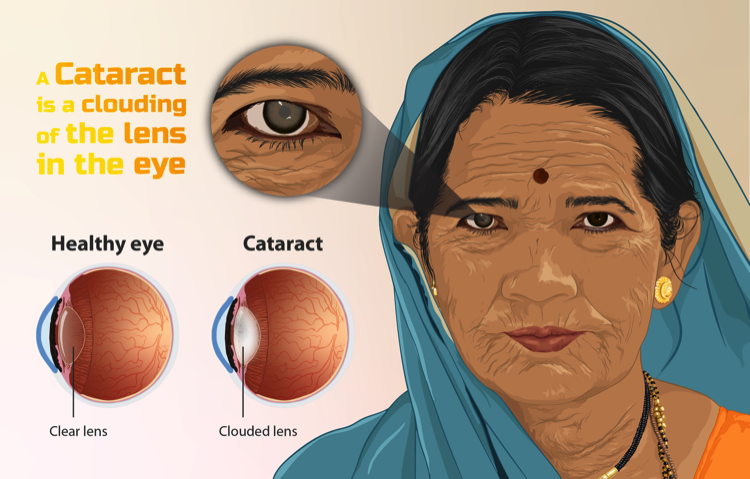- Possible Complications
What Are Cataracts?
Within a healthy eye, the lens is essential for focusing light on the back of the eye so we perceive a clear image. As we age, the translucent lens becomes cloudy and this can blur the focus of images that are received at the back of the eye. The clouded lens is known as a cataract.
Image: Healthy Eye vs Cataract Eye Wikimedia Commons
Symptoms of Cataract
Cataracts typically cause a gradual change in vision but you may gradually become aware of some of the symptoms listed below.
Please note these symptoms may also be caused by other diseases so a full eye examination is needed to diagnose cataracts.
• Glare - becoming more aware or sensitive to glare
• Trouble in low light, poor night vision
• Halos or ‘starbursts’ around bright light sources such as lamps
• Increased sensitivity to bright light
• Hazy or foggy vision
• Newly improved reading and close-up vision
• Dulled colour vision
• More frequent changes in glasses or contact lens prescription
Prevention of Cataracts
While cataracts cannot be entirely prevented, certain lifestyle measures may help delay their onset:
• Protect your eyes from UV radiation by wearing quality sunglasses.
• Manage conditions like diabetes.
• Quit smoking.
• Have regular eye examinations to detect cataracts early
Cataract Surgery
Cataract surgery is a common and highly successful day procedure meaning patients can go home on the same day.
Once a cataract is significantly reducing vision, surgery is needed to remove the cloudy lens and replace it with a permanently implanted artificial lens or intraocular lens (IOL).
If the eye is healthy, cataract surgery will restore excellent vision for 98-99% of patients (ref:RANZCO).
Complications of cataract surgery - All surgical procedures are associated with risks. Serious complications following cataract surgery are not common. If complications do occur, vision may be impaired or lost.
Risks can include infection or inflammation of the eye, bleeding in the eye, increased pressure in the eye, swelling of the cornea, damage to the implanted lens or lens capsule. There can be rare cases of retinal detachment or other causes of blindness.
You can discuss any concerns you may have with your specialist prior to surgery.
Site by Constant Creations


